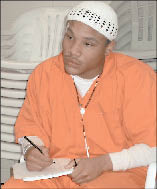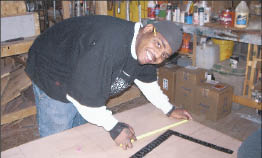 |
|
Free Minds draws in youth convicted as adults (like Delonte, above) with book discussions and writing exercises … |
Washington, D.C.
(202) 468-4809
http://www.freemindsbookclub.org
Objective: Introduce young inmates to books and creative writing.
In a Nutshell: Free Minds uses books and creative writing to empower young inmates to transform their lives, while also connecting them with support services. Free Minds serves 16- and 17-year-old males who have been charged as adults and held in the city’s jail.
The programs three facets are: the book club (serving juveniles at the jail), continuing support for youths after their transfer to prison, and re-entry services (connecting them to resources, such as GED classes, job skills and vocational training, and employment).
When and Where It Happens: The book club meets weekly at the jail, with staffers returning once a week to meet with youths one on one. Continuing support is done by correspondence with club members after they are transferred to federal prison facilities (Washington does not have a local prison), and re-entry services are conducted with youths individually after they return home.
Who Started It and Who Runs It: In 1996, Kelli Taylor was working as a journalist when she received a letter from Glen McGinnis, a young inmate on death row in Texas. Taylor produced a documentary about McGinnis and other juvenile inmates who had been sentenced to death. After the young man’s execution in 2000, Taylor began planning Free Minds, which she opened in 2002 with fellow journalist Tara Libert.
Today they operate the nonprofit with two employees: Taylor as executive director and Libert as deputy director. About 20 volunteers serve as pen pals with clients when they are in prison.
 |
|
… then helps those youths, like Lamarzs, find education and employment opportunities when they are released. |
Overcoming Obstacles: The program began simply as a book club at the jail. After the first two years, many of the initial participants had been released back into the community, and Free Minds recognized that it needed a re-entry component. Taylor set up a system through which Free Minds connects recently released inmates with existing community programs and services.
Cost: The annual operating budget is $194,000.
Who Pays: Funders include Rockefeller Philanthropy Advisors and the World Bank Community Fund. Social Solutions waived the licensing fee for Free Minds’ use of its Efforts to Outcomes software, which helps to evaluate the impact of the organization’s work.
Youth Served: About 50 members join each year. Ninety-five percent are African-American, and 5 percent are Latino. They read, on average, at a fifth-grade level, and most have dropped out of or disengaged from school.
The most common charges that Free Minds clients face are armed robbery and carjacking, Taylor says.
Youth Turn-On: “The book club is a way for them to get out of their cell and see new faces,” Taylor says. “Free Minds initially introduces them to books with characters that look and talk like they do. The themes of the book – poverty, crime, incarceration, redemption – resonate with them because of their situation. Often, they have never experienced a book in this way before.”
Youth Turn-Off: Because many of the participants have had very negative experiences in school, Taylor says, they often must be convinced that “reading and writing are not chores, but rather an opportunity to open up their world in ways they never could have imagined.”
Research Shows: Free Minds has just begun to measure outcomes. For the 36 participants who were released from incarceration last year, 24 were not incarcerated again as of March. Of the 12 who were re-arrested, six faced new charges and six had violated probation.
What Still Gets in the Way: “Conforming to and complying with the security restrictions of a corrections facility is a continuing challenge,” Taylor says. “Often we arrive at the jail only to find that the entire facility is on lockdown until further notice. This is a situation which will not improve though, so it is important to be flexible.”






























